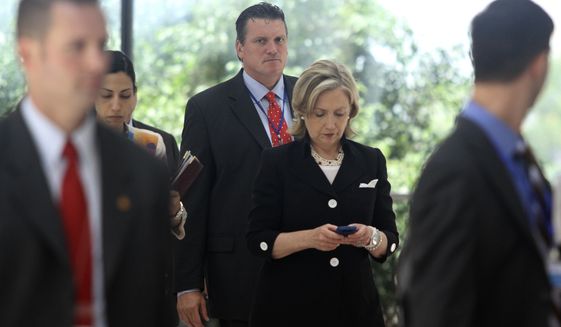Results 1 to 1 of 1
Thread Information
Users Browsing this Thread
There are currently 1 users browsing this thread. (0 members and 1 guests)
-
08-17-2015, 07:09 PM #1
New Clinton email count: 305 documents referred with potentially classified informati
New Clinton email count: 305 documents referred with potentially classified information
Secretary of State Hillary Rodham Clinton checks her phone after attending a U.S.-Russia meeting in Hanoi, Vietnam on July 23, 2010. The revelation that Mrs. Clinton used an off-the-books email account during her time as secretary of state has raised ... more
By Stephen Dinan - The Washington Times - Monday, August 17, 2015
More than 300 of former Secretary Hillary Rodham Clinton’s emails — or 5.1 percent of those processed so far — have been flagged for potential secret information, the State Department reported to a federal court Monday.
Officials insisted, however, that the screening process is running smoothly and they are back on track after falling behind a judge’s schedule for making all of the emails public.
The reviewers have screened about 20 percent of the 30,000 emails Mrs. Clinton returned to the department, which means if the rate of potentially secret information remains steady, more than 1,500 messages will have to be sent to intelligence community agencies, known in government as “IC,” to screen out classified information
“Out of a sample of approximately 20% of the Clinton emails, the IC reviewers have only recommended 305 documents — approximately 5.1% — for referral to their agencies for consultation,” the Obama administration said in new court papers.
Officials are trying to head off a request by the plaintiffs, who sued to get a look at Mrs. Clinton’s emails and who want the court to impose new oversight to make sure the State Department is working quickly and fairly.
Dozens of messages already released publicly have had information redacted as classified, raising questions about Mrs. Clinton’s security practices when she declined to use the regular State.gov system and instead issued herself an email account on a server she kept at her home in New York.
Mrs. Clinton has insisted she never sent any information that was classified and said she never received information from others that was marked classified at the time — though it has since been marked as such.
“I was permitted to and used a personal email and, obviously in retrospect, given all the concerns that have been raised, it would have been probably smarter not to,” she told Iowa Public Radio last week. “But I never sent nor received any classified emai l, nothing marked ’Classified.’ And I think this w ill all sort itself out.”
She also took credit for the release of the emails, which she returned to the government nearly two years after she left office, saying that “if I had not asked for my emails all to be made p ublic, none of this would have been in the public arena.”
The emails, however, are being made public by federal District Judge Emmet G. Sullivan, in response to the lawsuit from Jason Leopold, a reporter at Vice.
Judge Sullivan has set a strict schedule for the State Department to meet in releasing the emails on a monthly basis. The department, however, missed the July target by more than 1,000 pages of emails, and blamed the need to screen out classified information as the reason for breaking the judge’s order.
In its new filing Monday, the State Department said it will catch up by the end of September, saying intelligence community screeners are now integrated into the process.
http://www.washingtontimes.com/news/...ocuments-pote/
Similar Threads
-
2 Classified Documents Leaked By Egyptian Security Implicate Obama, Clintons
By AirborneSapper7 in forum Other Topics News and IssuesReplies: 0Last Post: 05-22-2014, 08:17 PM -
Employees' potentially fake documents will be investigated
By FedUpinFarmersBranch in forum illegal immigration News Stories & ReportsReplies: 4Last Post: 08-02-2008, 08:10 PM -
Classified documents more about covering flaws
By posylady in forum illegal immigration News Stories & ReportsReplies: 1Last Post: 08-11-2006, 11:41 PM


 LinkBack URL
LinkBack URL About LinkBacks
About LinkBacks





 Reply With Quote
Reply With Quote


Listen to William Gheen on Rense Apr 24, 2024 talking Invasion...
04-25-2024, 02:03 PM in ALIPAC In The News